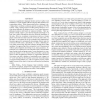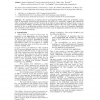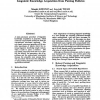120
click to vote
ACL
2011
14 years 5 months ago
2011
Understanding language requires both linguistic knowledge and knowledge about how the world works, also known as common-sense knowledge. We attempt to characterize the kinds of co...
132
click to vote
ICASSP
2011
IEEE
14 years 5 months ago
2011
IEEE
Word discovery is the task of discovering and collecting occurrences of repeating words in the absence of prior acoustic and linguistic knowledge, or training material. The capabi...
149
click to vote
ICASSP
2011
IEEE
14 years 5 months ago
2011
IEEE
Korean is an agglutinative language that does not have explicit word boundaries. It is also a highly inflective language that exhibits severe coarticulation effects. These charac...
107
click to vote
DKE
2000
15 years 1 months ago
2000
In this paper we present a natural language interface architecture, which is used for accessing FAQ knowledge bases. Since one of the main obstacles to the efficient use of natura...
121
click to vote
COLING
2000
15 years 1 months ago
2000
s; these annotations provide an abstract description of the effects of particular linguistic choices, allowing the planner to evaluate these choiceswithout needing any linguistic k...
117
click to vote
LRE
2006
15 years 2 months ago
2006
Detecting idioms in a sentence is important to sentence understanding. This paper discusses the linguistic knowledge for idiom detection. The challenges are that idioms can be ambi...
109
Voted
COLING
1992
15 years 3 months ago
1992
This paper presents a plan-based model of dialogue that combines world, linguistic, and contextual knowledge in order to recognize complex communicative actions such as expressing...
112
click to vote
COLING
1990
15 years 3 months ago
1990
We propose an architecture for the organisation of linguistic knowledge which allows to (1) separately formulate generalizations for different types of linguistic information, and...
107
click to vote
COLING
1994
15 years 3 months ago
1994
: We demonstrate an approach and an accompanying UNIX toolbox for performing wtrious kinds of Knowledge tT,xlractions and Structuring. The goal is to "practically" enhanc...
101
click to vote
EACL
1993
ACL Anthology
15 years 3 months ago
1993
ACL Anthology
A semi-automatic procedure of linguistic knowledge acquisition is proposed, which combines corpus-based techniques with the conventional rule-based approach. The rule-based compon...



